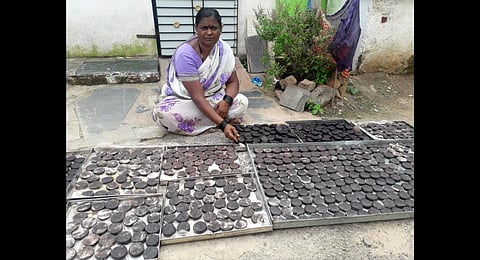

GADAG: Most families cherish their traditional secret recipes. Likewise, the Havanurs of Gadag have allowed their time-honoured catechu to send a ‘blast of fresh air’ among the people of North Karnataka and beyond, literally.
This humble family has aced the traditional art of preparing catechu over generations, whose popularity has crossed the state’s borders into Andhra and Tamil Nadu as well. Catechu is the extract of the acacia tree, which is used as an astringent, food additive, tannin and dye, and is a popular ingredient while putting paan together. It is widely used in North Karnataka as an ayurvedic medicine, and is prescribed for women to treat cough and cold during pregnancy, for children with wheezing who take it in hot milk, and for old people with respiratory illnesses who consume it with betel leaves.
The Havanurs’ recipe fits well as a mouth freshener, digestive and throat cleanser, blended harmoniously with dashes of clove, cardamom, cinnamon, menthol, jeshtamadhu and sugar. The acacia bark is sourced from the surrounding plantations, and the final product makes its way to ayurvedic stores and traditional vaidya clinics, apart from paan shops. It is customary in rural North Karnataka to also offer catechu in the tamboolam during functions.
With the onset of monsoon, the demand for the product only grows. This time though, Covid-19 played a bigger role in driving demand, since many view it as an effective antidote to prevent throat and breathing-related issues. One of the most important factors behind the popularity of this family’s catechu is its pricing. At Rs 6 for a box containing 100 gm, it’s a big draw among patrons from all walks of life, who can’t seem to have enough. Packets priced Rs 5 are sold to pan shops, while ayurvedic stores buy them in the form of round cakes which can be stored for more than three months.
In the Havanur family, Kabiradas (68) taught his son and daughter-in-law to make catechu the old-fashioned way, at their home. “Every year, during the rainy season, we get many orders. Our quality and affordable pricing are attractive. Apart from Karnataka, some agents from other states also place orders. But the recent lockdown did lead to some losses, but we are slowly recovering. Catechu is the best remedy for throat infection, and now its demand has increased due to the fear of the pandemic,” he says.
Parvatibai, one of the family members involved in making catechu, adds, “We have been selling our product from home. While there are catechu-makers in Bengaluru, Maharashtra, and elsewhere, many still come to us because of our superior quality at reasonable prices. We have never compromised on either. We avoid machines, and make the product by hand and dry the cakes, after which they are packed to be sold.”
One of the biggest questions in the minds of the Havanur family members is whether their cherished role will be carried forward by the coming generations. But that’s something that comfortably seems to find its answer, perhaps in the affirmative, in every coming monsoon.